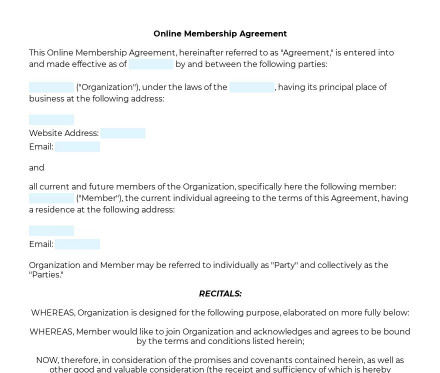Online Membership Agreement Free
An online group or organization can use this document when they want to accept a new member. The document can be used by different online groups or organizations, regardless of size.


 Template Overview
Template Overview
Most solo entrepreneurs and small organizations run a variety of online businesses that others can join. Therefore, an Online Membership Agreement is a frequently used document that is dominated by two parties: the organization and the member.
An organization is an entity that provides online services. A Member is a person who joins the said online organization.
A group or organization usually create these documents, so the member has no rights in the negotiation process.
Membership Agreements are not only operated to groups such as online communities. Any business that operates under an online membership model can use this document. For example, online fitness websites or websites providing access to premium media may use this agreement.
This contract is different from the regular Membership Agreement in that a typical agreement usually only concerns a business that does not operate online. Therefore, the terms of the arrangements differ as well.
You fill out a form. The document is created before your eyes as you respond to the questions.
At the end, you receive it in Word and PDF formats. You can modify it and reuse it.
 How to use this template
How to use this template
An online group or organization can use this document when they want to accept a new member. The document can be used by different online groups or organizations, regardless of size, as the document will provide the detailed information that each business needs.
The parties will provide all the necessary information when completing the contract. Precisely, the parties must specify the new member's name, address, the organization's name, and purpose of membership.
Once completed, we recommend that both parties sign the contract. Usually, the group or organization keeps a virtual copy, but we suggest that the new member also save the copy.
 Applicable law
Applicable law
Online Membership Agreements are usually governed by both federal laws (which regulate online data transfer and multi-state internet accessibility) and individual state laws (which govern the general and commercial principles of contracts).
Ready to build your document from this template?


 Please wait
Please wait
